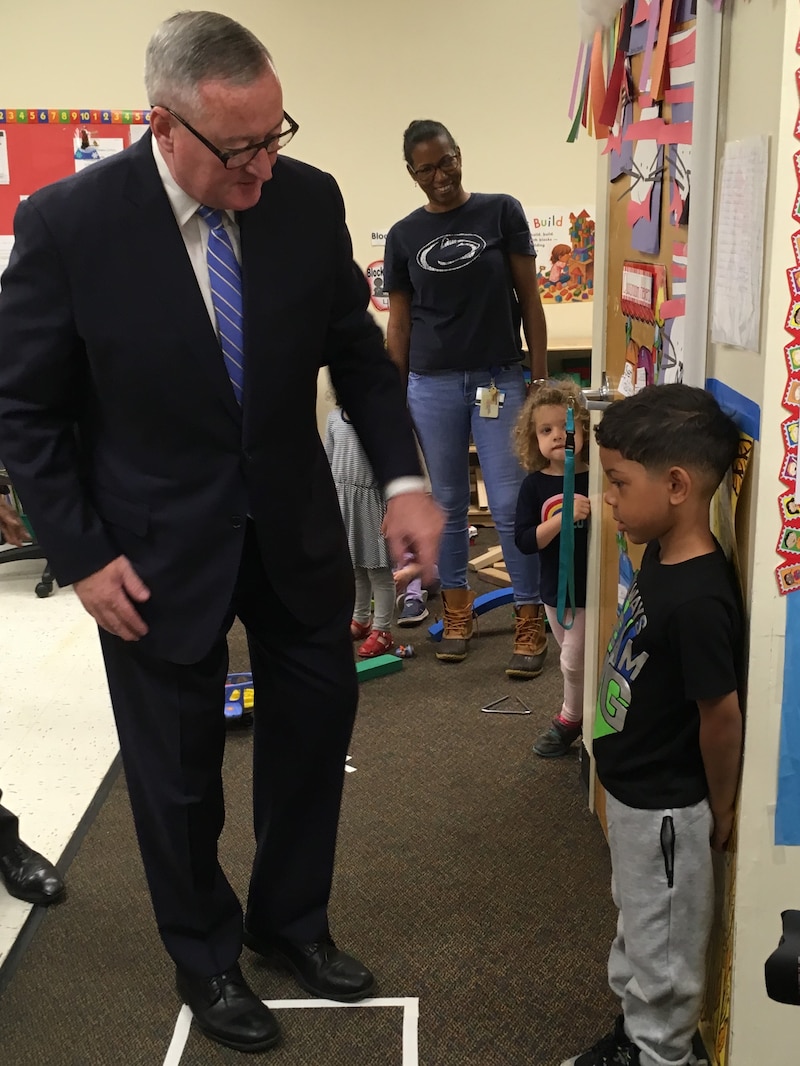This article was originally published in The Notebook. In August 2020, The Notebook became Chalkbeat Philadelphia.
The little girl stood against the wall while the big man solemnly took her measure.
“Thirty-four inches,” he said.
Next came a shy 3-year-old boy.
“Thirty-two inches,” the man said.
As a third child approached, Mayor Kenney was impressed. “Oh wow, he has to be about 40 inches!” Kenney marveled, as the boy’s height exceeded the three-foot mark etched on the wall.
Kenney was at the Drueding Center in North Philadelphia with City Council President Darrell Clarke on Monday morning to tout the expansion of his PHLpreK program, which seeks to provide free early childhood education to as many 3- and 4-year-olds in the city as possible.
The Drueding Center is one of the newest locations to join this initiative, which in the next year will support 3,300 pre-K seats at 140 locations across the city. The Drueding Community Center already supports 600 families and 1,000 children a year through its Early Child Learning Program for children as young as 6 weeks old, an afterschool program, and a summer camp.
Drueding Center executive director Anne Marie Collins said the site will provide pre-K to 15 additional students, which will create jobs in addition to supporting the needs of new families.

Mayor Kenney measures the height of a preschooler at the Drueding Center, a new site for PHLpreK. (Photo: Makoto Manheim)
At the kickoff, Kenney spoke of the value of PHLpreK, one of the priorities of his administration. It is financed largely through the tax on sugary beverages, which has largely beaten back legal challenges from the soda industry and political charges that it is discriminatory and primarily hurts the poor.
“I want to emphasize the program has very few requirements,” he said. “The child must be 3-4 years of age and live in Philadelphia. That’s it. There is no income requirement.”
As he has before, he emphasized the long-term payoffs for children, their families, and the city. Quality early childhood education, he said, “is important to build foundational skills for academic and social success. This is the place to form them, now, when [the children] are perfect and less affected by the issues in our city.”
Clarke mentioned the “controversy of funding,” but thanked the Mayor’s Office and the various PHLpreK partners. He also spoke about the importance of this new initiative.
“I don’t think there’s anything more important than helping young folk in a number of different ways,” he said. He went on to say that statistics show that one of the most effective ways to support young people is through early education.
After measuring the students, Kenney started reading How a Seed Grows to them. As he read, the students would interject at certain points and he would respond.
“Are you guys growing any plants now?” he asked as he read about how to grow bean plants.
“No,” one of the children said.
“No?” the mayor asked.
“What about those plants?” the teacher asked, pointing.
“Ohh, those plants,” the child replied, causing the mayor to laugh.
After he read, he asked the students some questions.
“How old are you?” he asked. Immediately, half of the children jumped up and starting chanting their age while holding up the appropriate number of fingers.
“Do you like coming into school every day?” he asked. The students said yes, albeit slightly less enthusiastically.
“How’s it going, young man?” he asked as he moved to the door, shaking the hand of a student who was not part of the reading circle.
Kenney then thanked everyone for letting him participate and headed out.
Editor’s Note: This story has been corrected to say that the Drueding Center will have 15 PHL PreK seats, not 50.

